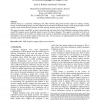1092 search results - page 175 / 219 » Understanding Context Before Using It |
147
Voted
CTW
2002
15 years 2 months ago
2002
ive. This characterization leads to model-based abstractions and representation design techniques as potential solutions. Many of the existing approaches to coping with data overlo...
111
Voted
INFSOF
2000
15 years 2 months ago
2000
Software design is a cognitively challenging task. Most software design tools provide support for editing, viewing, storing, and transforming designs, but lack support for the ess...
111
Voted
SYNTHESE
2008
15 years 1 months ago
2008
All paradoxes of self-reference seem to share some structural features. Russell in 1908 and especially Priest nowadays have advanced structural descriptions that successfully ident...
140
Voted
EC
2008
15 years 23 days ago
2008
A wide range of niching techniques have been investigated in evolutionary and genetic algorithms. In this article, we focus on niching using crowding techniques in the context of ...
56
Voted
SYNTHESE
2010
15 years 17 days ago
2010
I examine the radical contextualists’ two main arguments for the semantic underdeterminacy thesis, according to which all, or almost all, English sentences lack context-independ...

